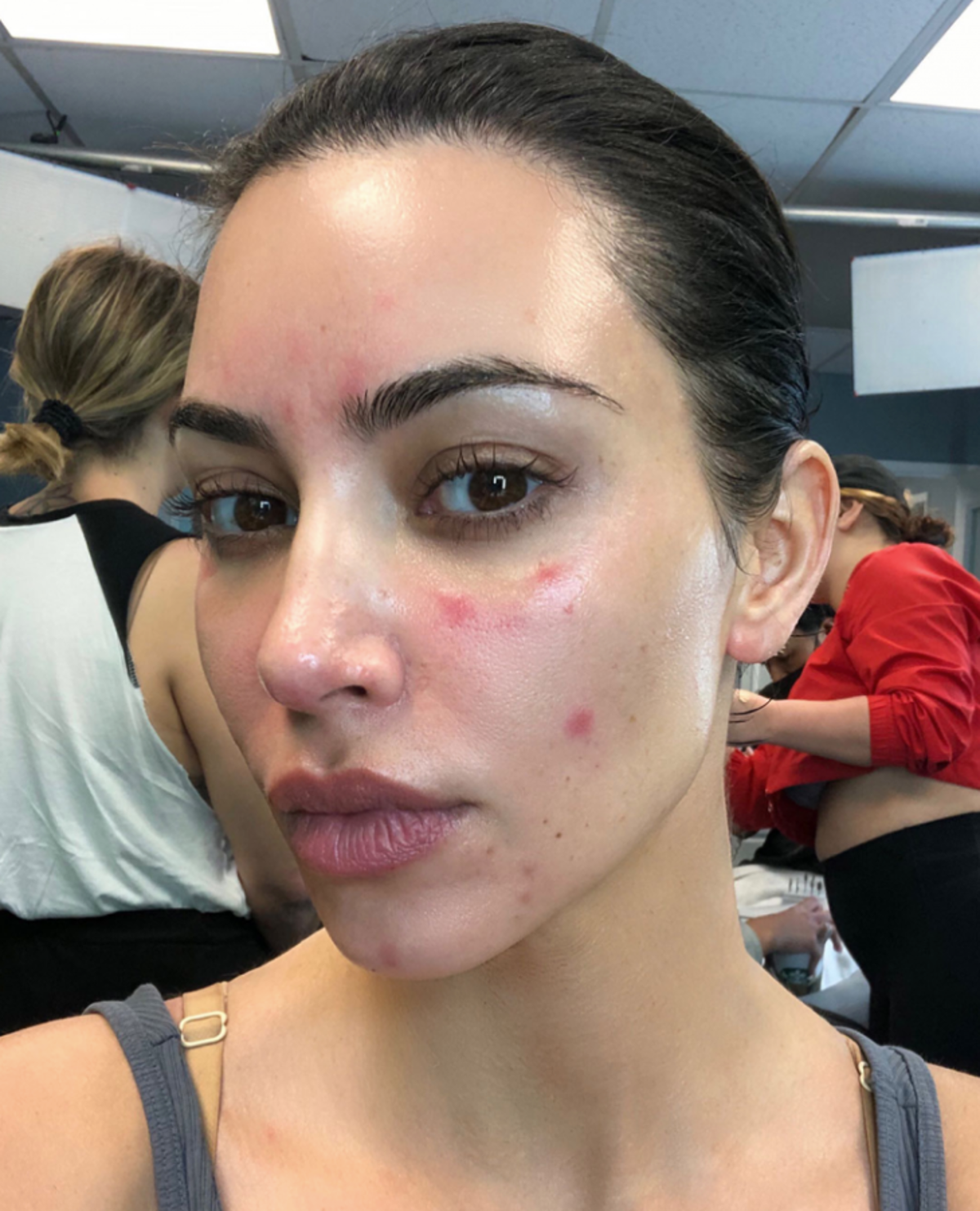Psoriasis: Finding Your Treatment Path
- Reality TV star Kim Kardashian, 42, and her mom Kris Jenner, 67, both live with psoriasis, an incurable skin condition that impacts young adults but is manageable with treatment. They both first experienced symptoms at ages 25 and 30 respectively.
- Psoriasis causes red, itchy patches to develop on the skin. There are seven different types of psoriasis with plaque psoriasis being the most common.
- Since family history is a risk factor for psoriasis, if both parents have it, their children's chances of inheriting the skin condition jump 75%.
- Symptoms for psoriasis can often be managed with different treatments and some lifestyle adjustments. Treatment options fall into three categories: topical creams, phototherapy, or systemic treatments such as oral medications.
- People with moderate to severe plaque psoriasis can find even more relief than ever before with the FDA-approved drug SOTYKTU (deucravacitinib). The advantage of this new drug compared to others is its high efficacy without the side effects that can typically come along with other types of oral drugs for psoriasis.
Reality TV star Kim Kardashian shares so may things with her business manager mom, Kris Jenner, 67, including the chronic skin condition called psoriasis. Kardashian revealed she and her mom have grown to battle the disease differently. What works for Jenner has actually caused her daughter more problems, and Kim says, even a sense of helplessness at times.

The Kardashians are household names for millions of television viewers and social media users. The family's popular reality TV show "Keeping Up with the Kardashians" lasted more than a decade chronicling the lavish lifestyles of the blended Kardashian-Jenner family. Family members who appeared regularly on the show also include Kourtney, Khloe, Kendall, and Kylie.
Read More
Kris Jenner was diagnosed with psoriasis at age 30 according to the National Psoriasis Foundation.
Kim experienced her first psoriasis flare-up at age 25 after she battled a common cold, which she says may have triggered the outbreak.
"My journey has been very different from my mom's, but I see so many similarities as well. She had it in her scalp and all over her body, and I'd see it all the time and remember her going to the tanning salon to try and ease it," Kardashian said.
Jenner resorted to phototherapy which uses UVB light rays. This form of treatment is often used when medications applied to the skin alone do not work and alternative options are needed. However, Kardashian said phototherapy was less effective for her.
"For me, however, that remedy would burn the areas and cause them to itch, so I always felt helpless," Kardashian explained.

At the time of her first flare-up, Kim got a cortisone injection from a dermatologist which cleared up spots on her stomach and legs. Despite occasional flare-ups, Kardashian has grown accustomed to living with the chronic skin condition and is managing her symptoms.
"I've become extremely comfortable with my psoriasis. No matter where it is on my body, sometimes I am fine with showing it off, and other times I don't want it to be a distraction, so I cover it up with body makeup," she said.
Does Psoriasis Run in the Family?
Psoriasis is a complex immune-mediated condition that is not contagious and is rather caused by a genetic predisposition; other risk factors include smoking, alcohol consumption, and obesity.
WATCH: What is psoriasis?
According to the National Institute of Health, "Many people with psoriasis have a family history of the disorder. Researchers have been able to identify certain genes linked to the disease, but they still don't fully understand the disease process. They do know that it isn't contagious."
The Psoriasis and Psoriatic Arthritis Alliance further explains children born to parents who have psoriasis face a "75%" chance of developing the skin condition. If one parent has psoriasis, the child's risk drops to "15%."

More on Psoriasis
How is Psoriasis Treated?
Although psoriasis is an incurable condition treatments offer much-needed hope for people living with the disease.
"I have patients who come in after having been to many other medical practices and not really getting much hope or really good treatments for their psoriasis," Dr. George Han, a dermatologist at Northwell Health/Lenox Hill Hospital, explains to SurvivorNet.
"And we'll give the patient a systemic medicine that these days are very effective. We have treatments where over half of the patients who have moderate to severe psoriasis are getting 100% clear," Dr. Han adds.
Topical medicines in the form of skin creams are considered mainstays in treating psoriasis symptoms. The type of topical you take depends on the kind of psoriasis you're dealing with and its related symptoms.
The seven different types of psoriasis include:
- Plaque psoriasis: This is the most common form of the disease and causes dry, raised skin patches that may be covered in scales. The patches may be itchy and tender.
- Nail psoriasis: This disease can affect fingernails and toenails and might cause nails to loosen from the nail bed.
Guttate psoriasis: This disease typically affects young adults and children and is often caused by a bacterial infection like strep throat. - Inverse psoriasis: This type of psoriasis mainly affects skin folds, so it will often present in areas such as the groin, buttocks, or breasts, and can worsen with friction or sweating.
- Pustular psoriasis: This is a rare form of psoriasis that causes pus-filled blisters to develop in widespread patches across the body.
- Erythrodermic psoriasis: This is also a rare form of the disease. It can cover the entire body with a red, peeling rash that may itch or burn intensely.
- Psoriatic arthritis: With this form of the disease, joints may become swollen and painful. Sometimes, joint pain is the first or only symptom, while other times other symptoms like nail changes will occur.
WATCH: There's more than one kind of psoriasis.
Some of the different topical creams that may be prescribed to help treat the various psoriasis types include:
- Corticosteroids: These drugs may be prescribed to treat mild to moderate psoriasis and can be a good option during flare-ups. They are available as ointments, creams, lotions, gels, foams, sprays, and shampoos. Topical corticosteroids are classified into seven categories based on their potency, ranging in strength from ultra-high to low. Lower-potency corticosteroids are typically used on the face, while areas with thick, chronic plaques often require treatment with ultrahigh-potency corticosteroids.
- Vitamin D analogues: These synthetic forms of vitamin D can help slow skin growth. The drugs can be used alone or in combination with corticosteroids. Calcipotriene (also known as calcipotriol) and calcitriol are the two commonly used synthetic vitamin D analogues.
- Retinoids: Retinoids can come as a gel or cream and be used to relieve some psoriasis symptoms. Topical tazarotene can be particularly helpful for palmar-plantar psoriasis (palms and soles) and nail psoriasis, the AAD and NPF guidelines say.
- Calcineurin inhibitors: These drugs reduce inflammation and plaque buildup. These may be helpful in areas where the skin is thin, like around the eyes, but should not be used for long periods due to potential side effects. Although not FDA-approved for psoriasis, the topical calcineurin inhibitors tacrolimus and pimecrolimus are often used in the treatment of psoriasis.
- Salicylic acid: These shampoos and scalp solutions can reduce the symptoms of psoriasis on the scalp. Salicylic acid minimizes scaling and softens plaques. It can also be combined with other topical medications including corticosteroids.
- Coal tar: A product of coal, this medication has been used to treat psoriasis for more than a century, according to AAD and NPF. These drugs can reduce scaling, itching, and inflammation and can be included in shampoos, creams, and oils.
When Creams Don't Work, FDA-Approved Oral Medications May Be the Solution
Oral systemic treatments are medicines that are taken by mouth or injection and work throughout the body. Some of them available to psoriasis patients include:
Methotrexate: This medication was approved for psoriasis in 1972, and can be administered orally or intravenously. It works as an immunosuppressant that inhibits rapidly dividing cells. According to the American Academy of Dermatology and National Psoriasis Foundation guidelines, methotrexate is typically administered in doses ranging from 7.5 mg to 25 mg weekly as one dose or divided into three dosages over 24 hours. Common side effects include fatigue and nausea.
Apremilast (Otezla): This medication works by suppressing an enzyme inside inflammation cells. The most common side effects are diarrhea, nausea, upper respiratory tract infection, and headache.
Cyclosporine: Due to a host of potentially serious adverse effects, this drug isn't used for long-term psoriasis treatment. However, it does have a role "as a rapid-acting medication for severe, recalcitrant disease, acute flares, and erythroderma." Nephrotoxicity (kidney issues) and hypertension (high blood pressure) are the most common adverse side effects of cyclosporine.
Other systemic treatment options for psoriasis Biologic drugs, or biologics, which are given by injection or intravenous (IV) infusion (a slow drip of medicine into your vein), may also be given. These drugs target only specific parts of the immune system, while other systemic drugs target the whole system.
For people with plaque psoriasis the most common type of psoriasis SOTYKTU (deucravacitinib) is an FDA-approved drug that helps treat moderate to severe cases that has little to no side effects.
WATCH: What is SOTYKTU plaque psoriasis treatment?
Plaque psoriasis is characterized by thick and raised patches of skin known as plaques, with dry white or silvery scales covering these plaques.
"Since it comes from your genes, unless you change one of your parents, we're just treating it, not curing it," Dr. Mark G. Lebwohl, Dean of Clinical Therapeutics at the Kimberly and Eric J. Waldman Department of Dermatology at the Icahn School of Medicine at Mount Sinai, tells SurvivorNet.
He goes on to say for psoriasis patients prescribed deucravacitinib, they're encouraged to continue taking the medication.
"And so you continue to take it. And even if your skin clearsand it may clear for a whilewe are always thinking about, what is the psoriasis doing to your joints, and what is the psoriasis doing to your heart or other organs. For those reasons, we often do try to continue patients on treatment," Dr. Lebwohl continued.
Learn more about SurvivorNet's rigorous medical review process.

